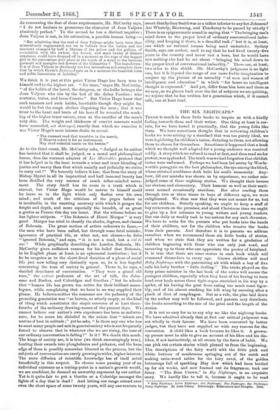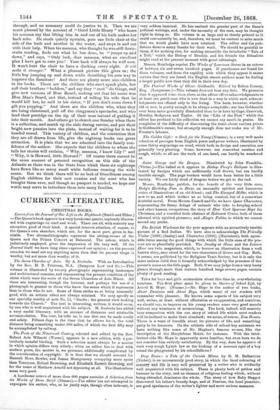THE SIX NIGHTCAPS.*
THERE is much in these little books to inspire us with a kindly feeling towards them and their writer. One thing at least is cer- tain, for we have tested it practically, that the young folks like them. We have sometimes thought that iu reviewing children's books we were setting tip a standard that was too purely ideal, we were legislating for children's tastes, dictating to them, not allowing them to choose for themselves. Sometimes it happened that a book which we thought well adapted for a young audience was received coldly. A story which we refused to read at first, and then read under protest, was applauded. The truth was we had forgotten that childish tastes were unformed. Perhaps we had been led astray by Words- worth's panegyric on the best philosopher, the eye among the blind, whose external semblance doth belie his soul's immensity. Any- how, till our mistake was shown us by experience, we rather mis- judged some of these nightcap stories. We thought their lessons too obvious and elementary. Their humour as well as their senti- ment seemed occasionally overdone. But after reading them through two or three times to boys of different ages, we were enlightened. We then saw that they were not meant for us, but for our children. Strictly speaking, we ought to keep a staff of boy reviewers on the premises, and about Christmas time we ought to give up a few columns to young writers and young readers. But our daily or weekly task is too serious for any such diversion. %Ire have to write for the parents who put books into the hands of their children, not for the children who receive the books from their parents. And therefore it is to parents we address ourselves when we recommend these sit little books of stories, and when we state that they are written for a gradation of children beginning with those who can only just read, and mounting up to those who can appreciate the poetry of fairyland. It is true that there are some stories in each book which will commend themselves to every age. Grown children will read Baby Nightcaps with the patronizing air with which a boy of five calls his baby brother " little darling." The tricks played on the fairy prime minister in the last book of the series will amuse the youngest children, especially when they hear of his having to turn head over heels across three tight-ropes stretched in his way by a spider, of his having the gout from eating too much roast tiger- lily, and of his almost cracking his left wing by sneezing after a pinch of dust of snapdragon. But as a rule, the plan laid down by the author may well be followed, and parents may distribute the books according to the size of the print and the length of the stories.
It is not so easy for us to say why we like the nightcap books. We have admitted already that at first our critical judgment was not wholly in their favour. We have been converted by better judges, but they have not supplied us with any reasons for the conversion. A child likes a book because he likes it. A grown- up person must be able to give an account of his likes and his dis- likes, if not instinctively, at all events by the force of habit. We can pick out certain stories which pleased us from the beginning. The descriptions of the fairy world with the little pink and white buttons of mushrooms springing out of the earth and making satin-wood tables for the fairy revel, of the golden buttercups full of sparkling May dew which had been bottled up for six weeks, and now foamed out its fragrance, took our fancy. " The Rose Crown," in Big Nightcaps, is an exquisite story. We hardly like to tell it, because it ought to be read • Baby Nightcaps; Little Nightcaps; Old Nightcap; New Nightcaps; Big Nightcaps; fairy Nightcaps. By Aunt Fanny. Edinburgh: Edmonton and Douglas. 1868. through, and no summary could do justice to it. Then we are much pleased by the account of " Good Little Henry " who hears his mamma say that lifting him in and out of his bath makes her back ache. He steals quietly upstairs, puts one little chair at the side of the bath and another in the water, and steps in and out with their help. When'his mamma, who thought he was still down- stairs reading, finds out what he has done, he " jumps up and down," and says, " Only look, dear mamma, what an excellent plan I have got to cure you! Your back will always be well now. It won't hurt the chair to have a ducking every night. It will make it stronger." What a pleasant picture this gives us; the little boy jumping up and down while describing his sure way to improve the furniture! And there are plenty more nice children in the books. There are the children who can't speak plain, but call their brothers " bedders," and say they " sant " do things, and give new versions of Blue Beard, making out that his name was Blue Man's Beard, and that, instead of tolling his wife that he would kill her, he said to his sister, " If you don't come down I gib you popping." And there are the children who, when they are being christened, pull off the clergyman's spectacles, and who land their porridge on the tip of their nose instead of guiding it into their mouth. And others go to church one Sunday when there is a collection, and march up the aisle during service, and put their bright new pennies into the plate, instead of waiting for it to be handed round. This variety of children, and the conviction that they are all drawn from life, give the nightcap books one great attraction. It is plain that we are admitted into the family con- fidence of the author. She expects that the children to whom she tells her stories will exclaim, " Why, mamma, I know Lily I" and " Why, it is Howard, little Howard !" Of course there cannot be the same amount of personal recognition on this side of the Atlantic as there was in the State from which these six nightcaps have flown like so many small white balloons crossing the wide ocean. But we think there will be no lack of friendliness among English children for their new cousins and the aunt who has brought them over, and though no passport is needed, we hope our words may serve to introduce them into many families.



































 Previous page
Previous page